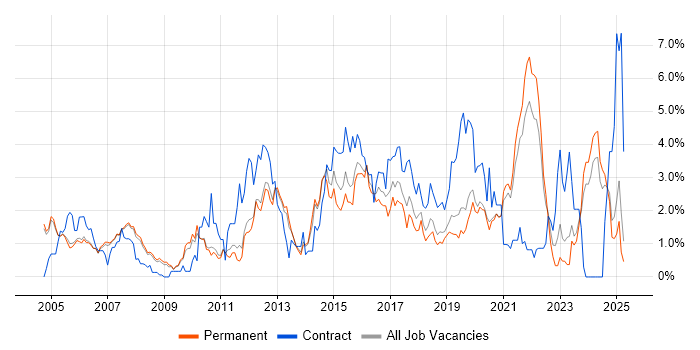Data Modelling
Oxfordshire > Oxford
The table below provides summary statistics for permanent job vacancies advertised in Oxford requiring Data Modelling skills. It includes a benchmarking guide to the annual salaries offered in vacancies that cited Data Modelling over the 6 months leading up to 17 May 2025, comparing them to the same period in the previous two years.
| 6 months to 17 May 2025 |
Same period 2024 | Same period 2023 | |
|---|---|---|---|
| Rank | 33 | 42 | - |
| Rank change year-on-year | +9 | - | - |
| Permanent jobs citing Data Modelling | 3 | 25 | 0 |
| As % of all permanent jobs advertised in Oxford | 1.35% | 3.82% | - |
| As % of the Processes & Methodologies category | 1.38% | 4.39% | - |
| Number of salaries quoted | 3 | 8 | 0 |
| 10th Percentile | £37,250 | £46,625 | - |
| 25th Percentile | £38,750 | £50,000 | - |
| Median annual salary (50th Percentile) | £42,500 | £56,500 | - |
| Median % change year-on-year | -24.78% | - | - |
| 75th Percentile | £58,125 | £66,250 | - |
| 90th Percentile | £66,750 | £73,000 | - |
| Oxfordshire median annual salary | £40,000 | £60,000 | £58,750 |
| % change year-on-year | -33.33% | +2.13% | -7.84% |
All Process and Methodology Skills
Oxford
Data Modelling falls under the Processes and Methodologies category. For comparison with the information above, the following table provides summary statistics for all permanent job vacancies requiring process or methodology skills in Oxford.
| Permanent vacancies with a requirement for process or methodology skills | 217 | 569 | 422 |
| As % of all permanent jobs advertised in Oxford | 97.75% | 87.00% | 94.41% |
| Number of salaries quoted | 120 | 419 | 244 |
| 10th Percentile | £43,625 | £29,800 | £31,250 |
| 25th Percentile | £51,250 | £40,813 | £41,250 |
| Median annual salary (50th Percentile) | £62,500 | £52,500 | £55,000 |
| Median % change year-on-year | +19.05% | -4.55% | -8.33% |
| 75th Percentile | £77,500 | £64,750 | £72,500 |
| 90th Percentile | £95,125 | £75,000 | £85,000 |
| Oxfordshire median annual salary | £55,000 | £50,000 | £52,500 |
| % change year-on-year | +10.00% | -4.76% | -4.55% |
Data Modelling
Job Vacancy Trend in Oxford
Job postings citing Data Modelling as a proportion of all IT jobs advertised in Oxford.

Data Modelling
Salary Trend in Oxford
3-month moving average salary quoted in jobs citing Data Modelling in Oxford.
Data Modelling
Salary Histogram in Oxford
Salary distribution for jobs citing Data Modelling in Oxford over the 6 months to 17 May 2025.
Data Modelling
Co-occurring Skills and Capabilities in Oxford by Category
The follow tables expand on the table above by listing co-occurrences grouped by category. The same employment type, locality and period is covered with up to 20 co-occurrences shown in each of the following categories:
